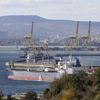
[ad_1]

Tires of a truck are pictured at a fuel station in Frankfurt, Germany, Jan. 27. A European ban on imports of diesel gasoline and different merchandise constructed from crude oil in Russian refineries takes impact Feb. 5. The purpose is to cease feeding Russia’s warfare chest, however gasoline prices have already jumped for the reason that warfare began and so they may rise once more.
Michael Probst/AP
disguise caption
toggle caption
Michael Probst/AP

Tires of a truck are pictured at a fuel station in Frankfurt, Germany, Jan. 27. A European ban on imports of diesel gasoline and different merchandise constructed from crude oil in Russian refineries takes impact Feb. 5. The purpose is to cease feeding Russia’s warfare chest, however gasoline prices have already jumped for the reason that warfare began and so they may rise once more.
Michael Probst/AP
Global oil markets are bracing for extra upheaval within the subsequent couple of weeks after the European Union bans all Russian refined oil merchandise in retaliation for the warfare in Ukraine. Starting Sunday, the 27-nation bloc will prohibit imports of Russian gasoline, diesel and different merchandise used all through Europe.
At the identical time, the Group of Seven superior international locations and allies will institute a worldwide value cap on Russian refined oil merchandise. That will bar entry to ships, marine insurers and companies until the refined oil merchandise are bought for a value at or beneath an agreed restrict. The same system went into effect for Russian crude oil in December.
A value cap for refined merchandise has but to be set. Analysts say there’ll probably be one value set for diesel, one other for merchandise comparable to gasoline.
Sales of oil and pure fuel make up the lion’s share of Russia’s government budget. The United States, the EU and different allies are concentrating on Russian vitality in a bid to tighten the financial noose across the Kremlin, making it tougher to finance its warfare in Ukraine. But the measures may additionally result in value spikes.
It impacts gasoline for planes, vehicles, vans and equipment
For the final couple of months, the EU has banned Russian crude oil imports however allowed the sale of refined merchandise. The bloc will now be a part of the United States and the United Kingdom in implementing a broader embargo.
The new EU ban will apply to something produced from Russian crude oil, says Richard Bronze, head of geopolitics at Energy Aspects, a consultancy in London.

A pump nozzle at a fuel station is labeled “Diesel B7” in Schleswig-Holstein, Germany. Much of Europe transportation runs on the gasoline.
Axel Heimken/Picture Alliance through Getty Images
disguise caption
toggle caption
Axel Heimken/Picture Alliance through Getty Images

A pump nozzle at a fuel station is labeled “Diesel B7” in Schleswig-Holstein, Germany. Much of Europe transportation runs on the gasoline.
Axel Heimken/Picture Alliance through Getty Images
“Gasoline that goes into a car, the jet fuel that goes into a plane or diesel that goes into trucks, into operating machinery,” he says, “so it’s really the fuel that we actually consume and keeps the economy going.”
Last 12 months, Europe imported about 700,000 barrels per day of Russian diesel — round half its complete imports of the gasoline, in response to market analysts.
Europe has to look elsewhere, together with to U.S. suppliers
Matteo Ilardo, a London-based geopolitical analyst with the danger intelligence agency RANE, says the ban will have an effect for Europeans. He factors to France’s heavy reliance on Russian diesel.
“France usually imports around 20% of total seaborne diesel exports from Russia. So being able to phase out completely that much of diesel will be a challenge,” he says.
Europe has been gobbling up Russian diesel over the previous few months forward of the ban. Hedi Grati, the top of refining and advertising and marketing at S&P Global Commodity Insights, an vitality analysis and information firm in London, says Europe does have some refineries however not sufficient to fulfill the demand.
“The diesel will simply have to come from somewhere else,” he says. “The most logical suppliers are countries in the Middle East like Saudi Arabia, Kuwait, places like that, and then also India and the United States.”
And Russia seeks different consumers
Just because it did with the December ban on crude, Russia should discover new locations to promote its refined oil merchandise.
“Those could be in East Africa, in Asia, they could be in Latin America,” Grati says. “What you’re looking at is one great big reshuffle to get desirable barrels to Europe, and then barrels deemed undesirable from Russia to those other markets.”
In a twist, the ban on Russian oil merchandise may enhance its gross sales of crude to China and India. Both are giant refiners. It’s authorized for them to import Russian crude, refine it and ship it again to Europe, in response to Bronze with the Energy Aspects consultancy.
“It is being viewed by some critics as a loophole or a weakness. But I think that is a deliberate part of the policy design,” Bronze says. The U.S. and its allies need to make sure that the merchandise proceed flowing to international markets to keep away from value spikes.
It additionally displays variations between the way in which worldwide customs guidelines apply to crude oil versus refined merchandise, he explains.
“Once it’s been through a refinery, for customs rules, the oil is viewed as transformed and … then its country of origin becomes wherever that refinery was located,” Bronze says.
Market response is predicted, however will it sway Moscow?
Oil is a worldwide market, so the influence of the most recent ban will probably be felt past Europe. Ilardo says there’ll undoubtedly be turmoil within the international oil markets initially.
“We’ll … have a price spike definitely in February right after the ban comes in place,” he says. “This will be simply a market reaction. Markets don’t like uncertainty, so they usually react with price spikes.”
That’s not excellent news for shoppers or companies in Europe, which is already scuffling with a weakened financial system.
The massive query is whether or not this ban like the opposite could have any influence on Russian President Vladimir Putin in ending the warfare in Ukraine.
Bronze says undoubtedly the EU bans on crude and refined oil merchandise will harm Russia’s financial system.
“But I think the difficult question is whether that economic pain is enough to change President Putin’s attitude towards the conflict in Ukraine or his wider policies towards the West,” he says. “And I think that’s much less likely to happen.”
[adinserter block=”4″]
[ad_2]
Source link


